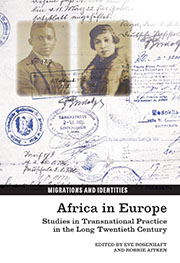Book contents
- Frontmatter
- Contents
- Acknowledgements
- List of Illustrations
- List of Abbreviations
- List of Contributors
- 1 Introduction
- I Enacting Identity: Individuals, Families and Communities
- II Authenticity and Influence: Contexts for Black Cultural Production
- III Post-colonial Belonging
- IV Narratives/Histories
- 12 Middle Passage Blackness and its Diasporic Discontents: The Case for a Post-War Epistemology
- 13 Black and German: Filming Black History and Experience
- 14 Excavating Diaspora: An Interview Discussing Elleke Boehmer's Novel Nile Baby
- 15 Afterword
- Bibliography
- Index
12 - Middle Passage Blackness and its Diasporic Discontents: The Case for a Post-War Epistemology
from IV - Narratives/Histories
- Frontmatter
- Contents
- Acknowledgements
- List of Illustrations
- List of Abbreviations
- List of Contributors
- 1 Introduction
- I Enacting Identity: Individuals, Families and Communities
- II Authenticity and Influence: Contexts for Black Cultural Production
- III Post-colonial Belonging
- IV Narratives/Histories
- 12 Middle Passage Blackness and its Diasporic Discontents: The Case for a Post-War Epistemology
- 13 Black and German: Filming Black History and Experience
- 14 Excavating Diaspora: An Interview Discussing Elleke Boehmer's Novel Nile Baby
- 15 Afterword
- Bibliography
- Index
Summary
The Middle Passage Epistemology
Just a quick glance at the table of contents of this volume, Africa in Europe, points to a significant and welcome difference from most of the other volumes on the Black/African diaspora that have preceded it: it is not framed by what I term the ‘Middle Passage epistemology’, or MPE. While academe is often derided as the ‘Ivory Tower’, cut off from the exigencies of the ‘real world’, academic production in fact reflects the cold economic realities of the postwar era so that those who make up the majority of the African diaspora in fact are not represented. Simply put, this is because the United States, even in what many including myself would consider its last gasps of empire, still dominates the world in terms of well-paid scholars, relatively wealthy universities and colleges, not to mention academic presses and academic publications. As a result, the majority of publications on the Black/African diaspora tend to reflect the ancestral experience of many African Americans despite the fact that African Americans, numerically speaking, comprise only 30 million of the some one billion Africans and peoples of African descent that are the African diaspora. This is the result, I would argue, of implicitly interpellating ‘blackness’ as a collective group identity through the MPE.
- Type
- Chapter
- Information
- Africa in EuropeStudies in Transnational Practice in the Long Twentieth Century, pp. 217 - 233Publisher: Liverpool University PressPrint publication year: 2013



